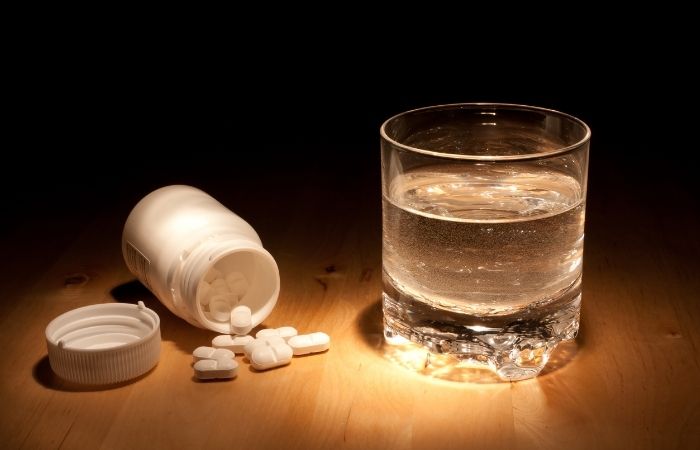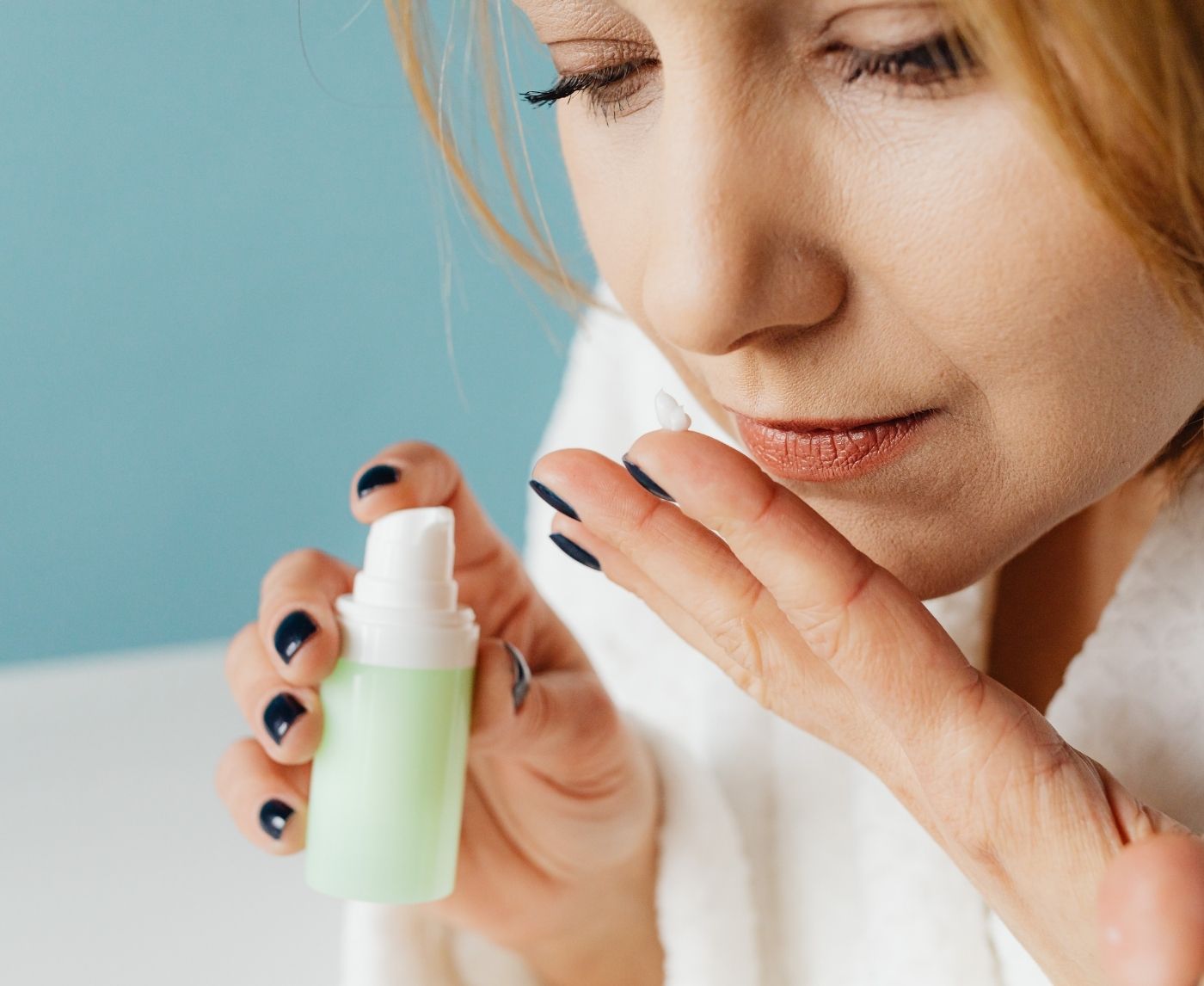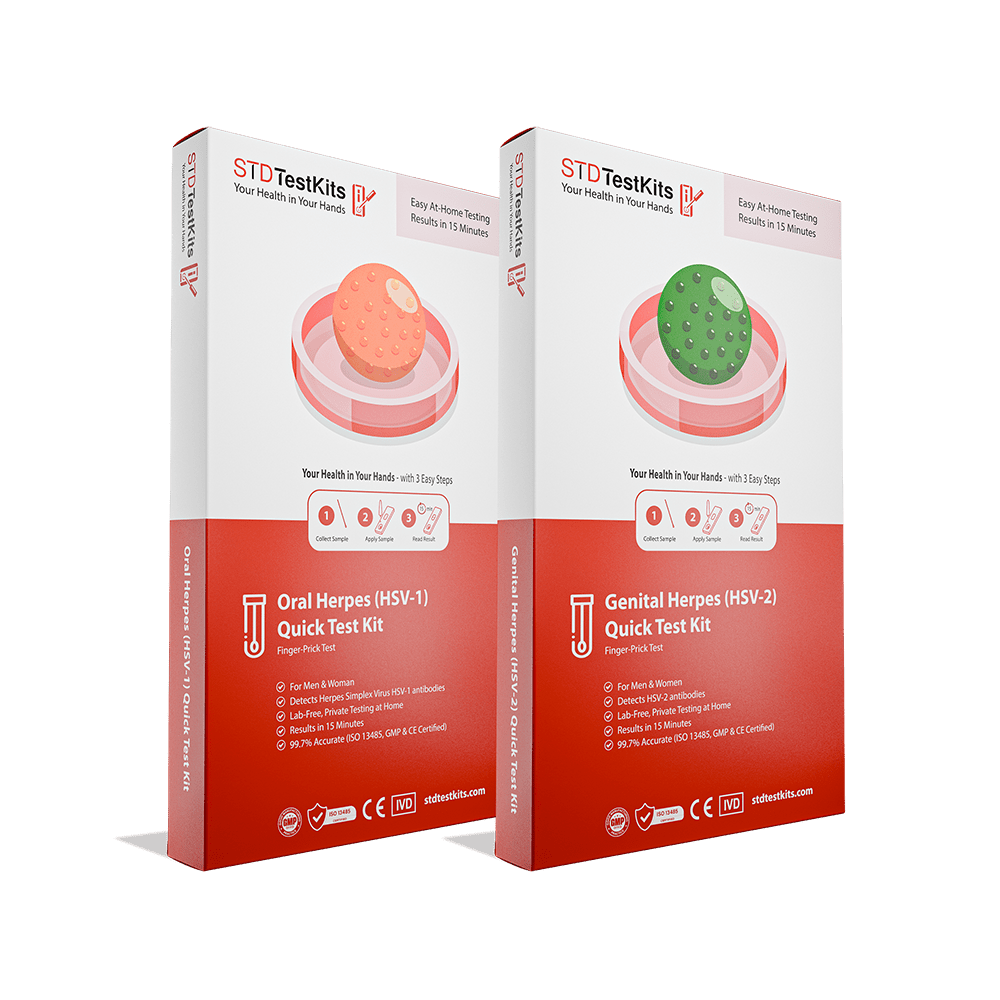Can You Have Herpes for Years Without Knowing?
Quick Answer: Acyclovir and valacyclovir are two antiviral drugs that work best to shorten and lessen the severity of herpes outbreaks. But if you use them correctly, home remedies like ice packs, Epsom salt baths, and topical lidocaine can really help with your symptoms.
Why This Hits So Hard (Even If It’s Not Your First Time)
Let’s be real: herpes isn’t just a virus, it’s a full-body emotional event. It brings shame, fear, discomfort, and often a total panic spiral. Especially during your first outbreak, the symptoms can feel unbearable. But even later ones can sneak up when you're stressed, run-down, or just not paying attention.
Outbreaks don’t follow a neat calendar. They’re unpredictable. For some, they hit every few months. For others, only once every few years. What makes them feel worse is the pressure to “do something” fast, to fix it, hide it, stop it. That pressure can drive people to try anything they read online.
Let’s meet Marissa, 24. She got her diagnosis two years ago and had mostly stayed asymptomatic until finals week.
“I was stressed, not sleeping, and suddenly there it was, a cluster of sores that made walking miserable. I rubbed aloe on it, took Tylenol, even tried witch hazel. Nothing really helped until I got my hands on valacyclovir.”
Marissa’s story is common. And it shows the difference between soothing and stopping. Some things help you feel better. Others help the virus back off. Sometimes you need both. That’s what this article is here to unpack.

People are also reading: Is That Toy Safe? What You Risk When Couples Share Sex Toys
What’s Actually Happening During a Herpes Outbreak?
A herpes outbreak starts when the virus, which lies dormant in your nerve cells, reactivates and travels to the skin. What triggers that reactivation can vary: stress, illness, hormone changes, friction, or even UV light. The immune system, distracted or weakened, gives the virus an opening.
You’ll usually notice a warning, tingling, itching, or burning in a localized area (called the prodrome). Then come the fluid-filled blisters, which eventually break, crust over, and heal. This process can take 7 to 14 days depending on the person and whether it’s a first or recurrent outbreak.
The first outbreaks usually last longer, hurt more, and spread more. The next ones are usually less severe. The good news? Many people notice that their outbreaks get less severe and less frequent over time, even if they don't take medicine every day.
Table 1. Herpes outbreak timeline. Early intervention can reduce the severity and length of each stage.
Antivirals Orescribed by a Doctor: The Quickest Way To Stop It
This is the best treatment you can get. Acyclovir, valacyclovir, and famciclovir are prescription antivirals that stop the virus from making copies of itself. They won't cure herpes (nothing will), but if you take them every day, they can make outbreaks shorter and even stop them from happening again.
This is how they usually work:
- Acyclovir: The first choice. During outbreaks, it is often taken three to five times a day.
- Valacyclovir (Valtrex): A more convenient choice that you only have to take once or twice a day and that your body absorbs better.
- Famciclovir is not used as often, but it works for both HSV-1 and HSV-2.
Antivirals can make the difference between 10 days of pain and 3–4 days of mild discomfort for many people. They work better the sooner you start them, ideally when you first feel a tingle. Some people keep a stash for this very reason.
Do Any Home Remedies Actually Work?
The short answer? Some do. Others don’t. And a few might actually make things worse. When it comes to managing a herpes outbreak at home, the goal isn’t to “cure” anything, it’s to make the ride smoother. That means reducing pain, itchiness, swelling, and stress while your body does the real work of healing.
Let’s start with what can help:
- Ice packs or cold compresses are hands-down one of the simplest, safest tools. They don’t treat the virus, but they can numb the area, reduce swelling, and bring real relief. Just don’t apply ice directly to your skin, wrap it in a soft towel and apply for 10–15 minutes at a time.
- Epsom salt baths are another classic. Warm (not hot!) water plus Epsom salt can ease discomfort, reduce inflammation, and help keep the area clean. Some people say it speeds healing; research is limited, but comfort counts, and this one’s low risk.
- Topical lidocaine (available over the counter) can numb the pain and make bathroom trips or walking less excruciating. Look for a product made for genital or sensitive areas, some anal sex prep products use lidocaine too and can be adapted for this purpose.
- Lysine supplements are often recommended online, and there’s some evidence to support their use. A few small studies suggest they may help reduce outbreak frequency, especially in people who have frequent recurrences. But don’t expect miracles, and always buy from a reputable source.
Here’s where things get tricky. Not every “natural remedy” is gentle or even helpful. Take tea tree oil, for example. It has antiviral properties, but it’s also harsh and can cause burning or skin irritation, especially on mucous membranes. The same goes for garlic paste, apple cider vinegar, or hydrogen peroxide. These may work on warts or acne, but they’re too aggressive for herpes lesions.
Let’s meet Carlos, 31. His first outbreak had him spiraling through YouTube videos and Reddit hacks.
“I dabbed diluted apple cider vinegar on it, thought I was doing something smart. It made the burning 10x worse. I ended up with raw skin and couldn’t wear underwear for two days.”
Carlos eventually switched to ice and ibuprofen, then saw a provider for antivirals. Lesson learned.
When in doubt, gentle is better. You’re not trying to disinfect a countertop. You’re treating inflamed, broken skin that’s already under viral attack.
Table 2. Home remedies for herpes outbreaks, what helps and what can hurt.
What About Over-the-Counter Products?
There’s no shortage of creams and gels marketed for herpes, cold sores, or “tingling relief.” But not all are created equal. Some are glorified lip balms. Others mimic the active ingredients in prescription treatments, but in much lower doses.
Topical antivirals, like docosanol (found in products like Abreva), are FDA-approved for cold sores, but their effect is modest, and they don’t work on genital outbreaks. Some OTC genital herpes creams contain zinc, lidocaine, or aloe vera, which can soothe but not shorten the outbreak itself.
If you’re reaching for OTC options, make sure you’re doing it for comfort, not because you think they’ll kill the virus. Nothing over-the-counter cures herpes. But the right product might make your next three days less miserable, and that’s worth something.
Want the closest thing to prescription relief without the waiting room? Many online platforms now offer doctor-approved herpes treatment after a short consult, sometimes same-day. These can ship meds discreetly to your door. Still unsure? Start with testing: order a herpes rapid test kit here.
Can You Combine Home Remedies and Medication?
Absolutely, and for most people, that’s the sweet spot. You don’t have to choose between ice packs or prescription pills. In fact, the most effective outbreak plans use both: meds to fight the virus from the inside, and home strategies to soothe the symptoms on the outside.
Think of it like this: if the antiviral is the firefighter putting out the flames, your home care is the cool towel on your forehead while you recover. They serve different functions, and both matter.
Take Jalen, 37. He manages his HSV-2 with daily valacyclovir and tracks his triggers in a notes app. “When I feel that tingle, I hit the meds immediately. Then it’s Epsom salt baths twice a day, loose clothes, and a no-stress policy. I bounce back fast, like, 3–4 days max now.”
Combination care doesn’t just mean throwing everything at the wall. It means using what’s been shown to help, strategically. That could look like:
- Starting antivirals at the first sign of prodrome
- Using lidocaine cream before going to the bathroom to ease burning
- Sitting in a salt bath at night for comfort
- Applying an ice pack after a long day to reduce swelling
- Logging the timing of outbreaks to spot personal patterns
Just don’t overdo it. More isn’t always better. And mixing strong topicals (like tea tree oil or alcohol-based creams) with prescription meds can irritate the skin, slowing healing. Pick a few reliable strategies and stick with them.
What Triggers a Herpes Outbreak?
Herpes is sneaky, it often strikes when your guard is down. But it’s not random. Understanding your own triggers can help reduce how often outbreaks happen. Here's what science and lived experience tell us are the most common culprits:
- Stress: Emotional stress doesn’t just mess with your mind, it affects your immune system, making it easier for HSV to reactivate.
- Illness: A cold, flu, or even COVID can distract your immune response enough to allow the virus to flare up.
- Menstrual cycle: For some people with vulvas, hormonal changes around their period can cause monthly outbreaks.
- Friction: Rough sex, shaving, or tight clothing can physically irritate the skin and provoke symptoms.
- Sunlight: Less common with genital herpes, but HSV-1 cold sores often flare after UV exposure.
Let’s not forget burnout, poor sleep, overexercising, or high alcohol use. The body’s line between “handling it” and “too much” is thinner than we think.
Many people start tracking their outbreaks in a journal or app to find patterns. You might discover you always flare up before a big exam or after three nights of poor sleep. Once you know your triggers, you can start building in protective buffers, like starting antivirals early, getting more rest, or switching to a gentler lube or condom material.
How Long Does a Herpes Outbreak Last, And Can You Speed It Up?
Most outbreaks, if untreated, last 7–14 days. First-time outbreaks tend to be longer and more intense; repeat ones are usually shorter. With prompt antiviral treatment, you might cut that time in half, or even head off the outbreak before it fully forms.
Here’s a simplified healing timeline to keep in mind:
Table 3. Typical herpes outbreak durations: untreated vs. actively managed.
Remember, even when the visible sores are gone, shedding can continue for a few days, especially in new or untreated cases. Using condoms and avoiding sex until fully healed can prevent transmission.
Bottom line: speed matters. The sooner you recognize your symptoms and act, the shorter and gentler your outbreak is likely to be. Don’t wait until things get bad. Start care at the first hint, and don’t be afraid to combine approaches.
Still Think You're Alone? You're Not.
Roughly 1 in 6 people in the U.S. have genital herpes, and most of them are doing the same thing you are, Googling in a quiet panic, trying to figure out what works, what’s real, and whether they’re doomed to a lifetime of awkward conversations and painful outbreaks. Spoiler: they’re not. And neither are you.
Getting smart about your herpes outbreaks isn’t about fear. It’s about control. It’s about knowing what to do, when to act, and how to protect both your body and your confidence. Whether you lean natural, medical, or somewhere in between, the goal is the same: less pain, more peace, and a life that isn’t defined by a diagnosis.
And if you’re reading this during an active outbreak? Take a breath. You’re not dirty. You’re not broken. You’re just human. And you’re going to be okay.

People are also reading: STD or Skin Irritation? What Red Spots on Your Vagina Really Mean
FAQs
1. Is there a cure for herpes?
Not yet. And yeah, that sucks. But here’s the real kicker: most people don’t need one to live full, sexy, wildly unbothered lives. What we do have are meds that keep outbreaks in check and partners who are way cooler about it than you think. Focus on management, not martyrdom.
2. Can I treat herpes naturally?
Kind of. Think “comfort” more than “cure.” Stuff like ice packs, Epsom salt baths, and lysine might help you feel better. But if you’re in the middle of a full-blown outbreak, it’s usually antivirals that pull the real weight. The best approach? Natural + medical, not either-or.
3. How fast do antivirals work?
Start them early enough, like, prodrome tingle early, and you could cut your outbreak in half. Some people feel major relief in just 2–3 days. Miss that window? You’ll still get benefits, but maybe not the lightning-fast kind.
4. What happens if I don’t treat an outbreak?
Your body will still handle it, eventually. But it might hurt more, last longer, and shed virus more freely (which ups your risk of passing it on). No treatment doesn’t mean no healing, it just means a bumpier ride.
5. Are over-the-counter creams worth it?
Depends what you’re hoping for. OTC lidocaine can make bathroom trips bearable. Zinc creams might help with healing. But those flashy “herpes cures” in a tube? Snake oil in shiny packaging. Read labels, not promises.
6. Do I have to avoid all sex during an outbreak?
Yes. Even with condoms. Outbreak = active virus. Skin-to-skin contact = high risk. Take the break. Watch a show. Cuddle. There are other kinds of intimacy that don’t involve risking transmission and regret.
7. What should I avoid during an outbreak?
Anything that sounds like a dare. Vinegar. Tea tree oil. Abrasive scrubs. Tight jeans. Popping sores like zits. This isn’t a moment for DIY danger. Be gentle. Loose cotton, cool compresses, and clean water are your new besties.
8. Will I need meds forever?
Only if you want to. Some folks take antivirals daily to prevent outbreaks or protect partners. Others only take them when symptoms start. It’s your call, your body, your sex life. No herpes police here.
9. What’s the difference between HSV-1 and HSV-2 outbreaks?
HSV-1 (often oral) tends to chill out faster and recur less. HSV-2 (usually genital) can be a bit more persistent but also responds well to treatment. Both are manageable. Both get unfairly judged. Neither defines your worth.
10. Can I get tested during an outbreak?
Absolutely. That’s actually prime time. A swab of an active sore gives you the most accurate result. If you’re past the outbreak phase, you’ll need a blood test, but wait at least 12 weeks post-exposure for those to show up clearly.
Control > Cure
You don’t need a cure to take your life back. You just need information, a plan, and a little less shame. Use meds when you need them. Use ice when you want relief. Track your outbreaks. Talk to your partners. Laugh at bad Reddit advice. And remember that you are not your virus, you’re a person who happens to carry one.
Want to know for sure what you’re dealing with? Start with testing. Order a herpes rapid test kit from the privacy of home and get answers in minutes, not weeks. You deserve clarity.
How We Sourced This Article: We used both clinical research and advice from sexual health professionals and people who have herpes. This article was based on about fifteen reliable sources, such as medical journals, CDC guidelines, and firsthand accounts. We've picked out some of the most useful and easy-to-read sources below.
Sources
1. Sexually Transmitted Infections Treatment Guidelines: Herpes – CDC
2. Genital Herpes: Diagnosis & Treatment – Mayo Clinic
3. Home Remedies for Herpes: 32 Oils, Herbs, and More – Healthline
4. Treatments That Heal Herpes Sores Faster – Verywell Health
5. A Narrative Review of Alternative Symptomatic Treatments for HSV – PMC (NCBI)
About the Author
Dr. F. David, MD is a board-certified infectious disease specialist with over 15 years of experience in STI education and clinical care. He believes in giving patients clear, shame-free information they can use to take action without fear.
Reviewed by: Hannah Li, PA-C, MPH | Last medically reviewed: October 2025
This article is for informational purposes only and should not replace professional medical advice, diagnosis, or treatment.






